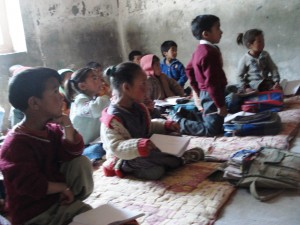READI Nepal Humla Delights Café Now Open for Business
Raj, the chairman of READI, has sent a wonderful report. The young man, Mr. Shiva, who went to Kathmandu for training, learnt well (thanks to the helpful manager of the Himalayan Java Coffee shop) how to make a variety of drinks and to bake many delicious breads and treats. He then bought, with their advice, a coffee machine, a bread making machine, glasses, cups and saucers, 3 tables and 12 chairs, a carpet – and set off back to Simikot.
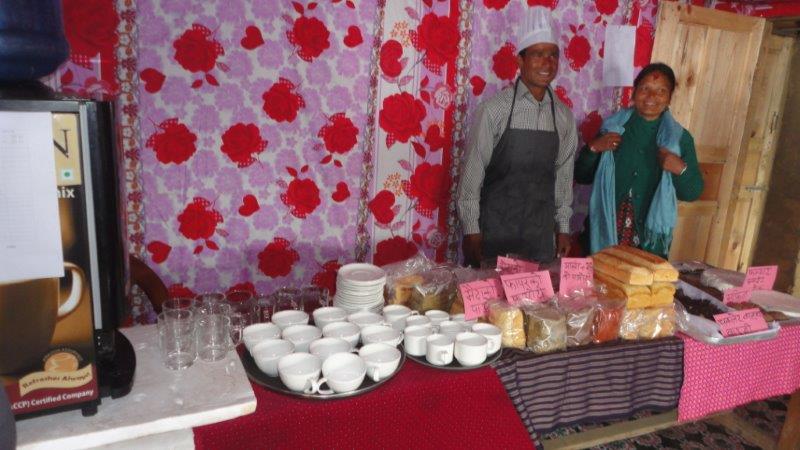
The lovely sign was carved in Kathmandu and represents the old and the new (English words in traditional Tibetan script) and the local culture of yak travel (the yak is trotting along holding a steaming cup of coffee on its back!). A grand opening was held on April 14, with 200 invited guests (government officials, teachers, tour operators) who were asked for their honest opinion.
It was all going so well – then the earthquake struck on April 25 and although it was distant, people were fearful to go inside buildings. So the food and drink went out to the people, with Mr. Shiva supplying coffee and food to office staff.
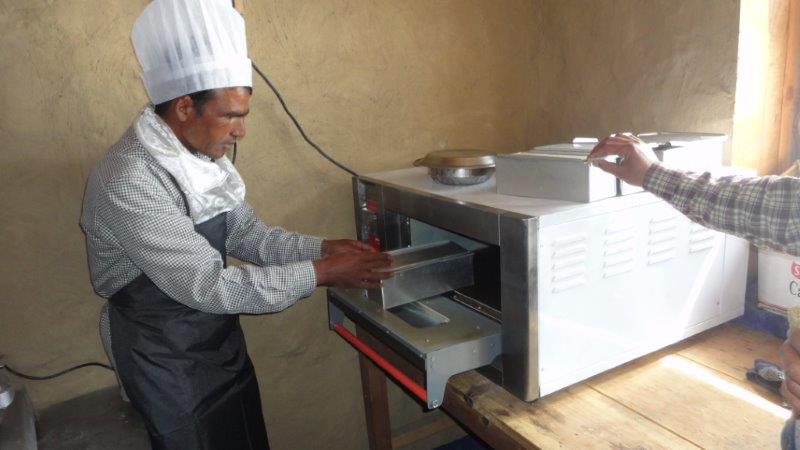
He is also baking breads for the children’s tiffin (lunch) and they are loving the taste of their local grains used in new ways. He is getting requests for Tibetan momos and other local favourites – so it seems like a success! Time will tell, but we applaud READI for an innovative way to raise funds for the children’s hostel and education.

Nepal Earthquakes Update
All TRAS partners and the children and families whom our projects support are safe, thank goodness, and damage seems to be minimal. At the same time, many are still sleeping outside, and the worries of the impending monsoon rains are only too real.
But just when things seemed to settle down after the April and May earthquakes nearer Kathmandu, we heard on May 23 that a 4.8 tremor hit far away Simikot, the tiny town where READI Nepal looks after 30 children in a rented hostel and is providing them with a good start in life. They are all safe, but scared stiff, and are currently sleeping outside in two very old tents. Mim Hamal, their director who works in Kathmandu, has been able to help out by finding two good tents and shipping them to Simikot this weekend. They have been planning to fundraise to build a proper hostel for the children – now they want to make sure it will be truly earthquake-proof.

Schools have been closed for a month and many people from Kathmandu have gone home to their villages to assess local damage. So we do not yet know the full picture of how our project partners are faring or what their needs will be in the long term.
TRAS starts a Nepal Rebuilding Fund One immediate request we have had for help in rebuilding is from the Tibetan Department of Education (DOE) with whom we have supported many projects over the years. Tibetans in Nepal are in a tenuous situation at the best of times, and now that their villages and buildings have suffered so much, they are desperate for funds for rebuilding. The DOE looks after 12 schools in Nepal, and 4 of these are damaged, although thankfully the children are safe. They receive no help at all from the Nepalese government or from the large international aid groups, so are turning to their long-time supporters for help. Here, for instance, is a photo of the badly damaged outer support wall at the Atisha Primary School, in Jawalakhel, Kathmandu. There are 57 pupils there, from pre-primary to Class 5.
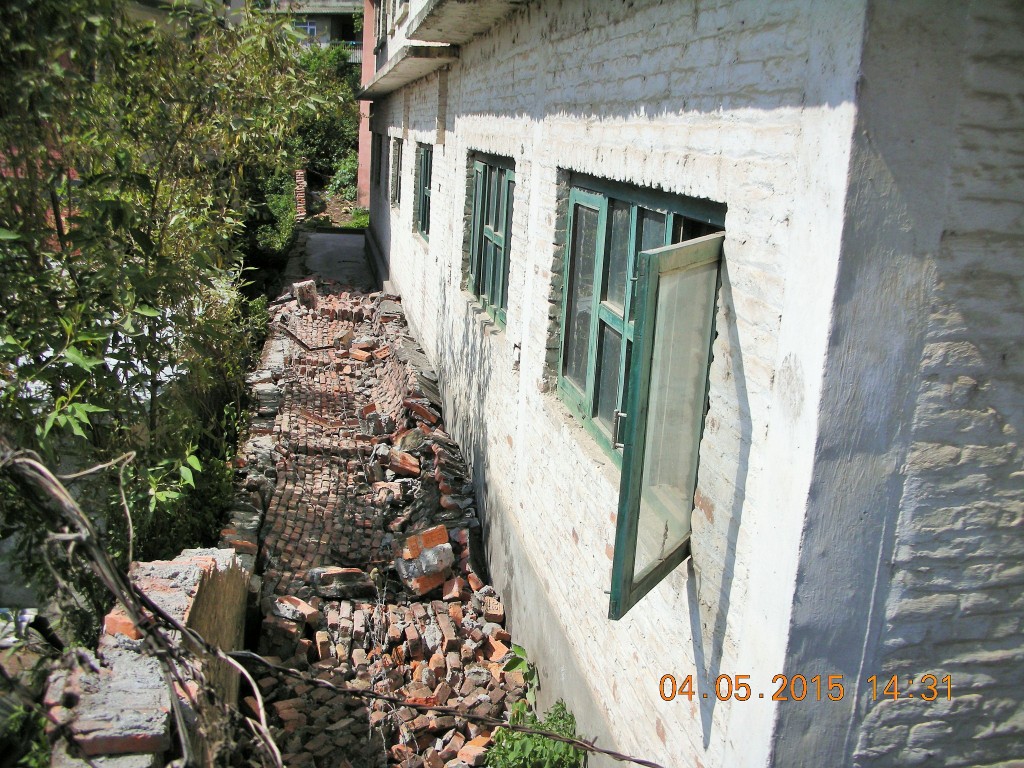
We expect READI Nepal will have costs related to last week’s tremor in Simikot, and the building of safe housing for the children. As things get sorted out, we know we will hear of more needs. Let’s start a ‘rebuilding and preparedness fund’ to help our partners cope with the unexpected and difficult problems they are facing in putting their lives back together and preparing for a safer future. Please help them by making a donation to this fund.
Mark your donation ‘Nepal Rebuilding Fund’. Our goal is $10,000 by the end of June. Thank you in advance for your generosity. Late Flash: North Vancouver students who visited Nepal in March/April have already donated $1,500 to this fund!
Dolakha, Nepal – Toilet Reconstruction
Project #323 – 2014-2015
Megha Shakya, TRAS Board Director, visited the TRAS funded toilet reconstruction project on February 12th and 13th, 2016. Here is his report.
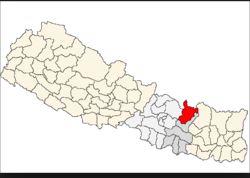
The village is situated in the lap of Mt. Gauri Shanker, a majestic Himalayan peak. The 6 hour drive from Kathmandu becomes pleasant all the way after the tourist resort of Dhulikhel. With a cup of tea at Zero one, the real journey begins. After Kharidhunga, there are valleys on the right as well as on the left of the road that runs along the ridge. Layers and layers of mountains and valleys, terraces and Himalayan peaks keep the journey pleasant. Once pristine, Charikot is now a bustling market place, often crowded. Then comes the historic Dolakha, a Newar settlement, after which one reaches Susmavati Village of Thamis, one of the earliest indigenous people known as Kiratis of Nepal.
 In my view, TRAS has made the right decision to support Shree Fashelung Social Service (SFSS) to rebuild the toilets. I visited many houses that are now reduced to rubble. There is not a single house in the village that did not suffer damage during the earthquake of April 2015. Except for some limited emergency relief of supplies like rice, corrugated sheets, clothes, and temporary learning centres for children by the government, NGOs like Plan International, individual donors, and the Nepal Red Cross, the entire 1540 households of the Susmavati Village area have not received any support for rebuilding. Almost into a year now since the disaster, all the households are living in makeshift shelters that have been created from salvaged materials. The makeshift toilets have been a serious concern to them. It was a very sad scene even now 10 months after the earthquake. It brought tears to my eyes.
In my view, TRAS has made the right decision to support Shree Fashelung Social Service (SFSS) to rebuild the toilets. I visited many houses that are now reduced to rubble. There is not a single house in the village that did not suffer damage during the earthquake of April 2015. Except for some limited emergency relief of supplies like rice, corrugated sheets, clothes, and temporary learning centres for children by the government, NGOs like Plan International, individual donors, and the Nepal Red Cross, the entire 1540 households of the Susmavati Village area have not received any support for rebuilding. Almost into a year now since the disaster, all the households are living in makeshift shelters that have been created from salvaged materials. The makeshift toilets have been a serious concern to them. It was a very sad scene even now 10 months after the earthquake. It brought tears to my eyes.
Every family in this area makes their living from limited land on the mountain slopes and some wages from labouring in nearby market centres like Dolakha Bazaar, Charikot and Kathmandu. Prior to the earthquake, the village was an Open Defecation Free and Indoor Smoke Free zone – this is by no means a small achievement.
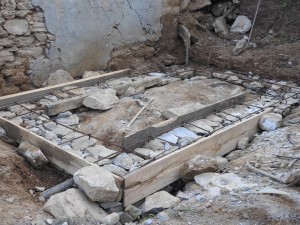 There is 24/7 electricity supply to the village from a micro-hydro unit that produces a little less than a kilowatt output just a kilometre down the stream – can be considered a luxury compared to Kathmandu with 16 hours of power cut every day. Almost all the households had high definition TV dish antennas. Every adult carries one cell phone. Before the earthquake, many households had permanent toilets with biogas plants that were used for cooking food. They looked comfortable with what they had. The Thami people are peaceful and content with what they have even now, although they have nothing except the few patches of land on the slopes of the mountains.
There is 24/7 electricity supply to the village from a micro-hydro unit that produces a little less than a kilowatt output just a kilometre down the stream – can be considered a luxury compared to Kathmandu with 16 hours of power cut every day. Almost all the households had high definition TV dish antennas. Every adult carries one cell phone. Before the earthquake, many households had permanent toilets with biogas plants that were used for cooking food. They looked comfortable with what they had. The Thami people are peaceful and content with what they have even now, although they have nothing except the few patches of land on the slopes of the mountains.
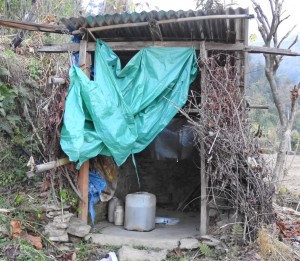 I spent an overnight in a thatch house on a slope on the roadside – courtesy of SFSS. The structure is standing on about 16 thin wooden poles with a diameter of five inches. I shared the room with the driver who drove me to this village. During the night, the driver told me that the thatch swayed whenever someone walked or if there was a gust of wind. At the back of our minds were the earthquakes that continued intermittently now and then. I did not want to think of that. The visit to the squat toilet at night was a nightmare because I had to navigate through unstable rocks some 30 feet down a slope.
I spent an overnight in a thatch house on a slope on the roadside – courtesy of SFSS. The structure is standing on about 16 thin wooden poles with a diameter of five inches. I shared the room with the driver who drove me to this village. During the night, the driver told me that the thatch swayed whenever someone walked or if there was a gust of wind. At the back of our minds were the earthquakes that continued intermittently now and then. I did not want to think of that. The visit to the squat toilet at night was a nightmare because I had to navigate through unstable rocks some 30 feet down a slope.
SFSS has calculated how many households would need toilets. They found the following: Total households 1540. Households living in Kathmandu and elsewhere: 200, households which have financial capability: 100, households having joint toilets: 300. From these figures, they have come up with the figure of 940 households needing toilets. Of this total need, TRAS has been approached to fund 200 toilets at this point in time.
SFSS has selected a first batch of 40 households to receive toilets on the basis of following criteria:
a. Households with more than 3 people living 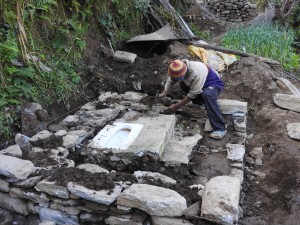
b. Lowest income
c. Permanent residency
d. Socially active
e. Total destruction of the former toilet by the earthquake
SFSS under Bhakta Singh Thami, a retired Police Constable, and his team impressed me by their work. All of them are working as volunteers. I met all of them. Every one of them lost their houses like everyone else in the village. They are diligently working to ensure that their village is rebuilt and have brought the village life style back to normal. They have let the villagers know the selection criteria and answered all questions from the community to ensure that there is no conflict.
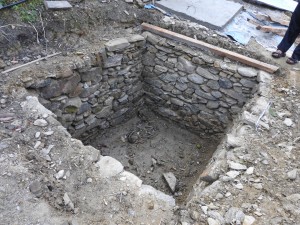 SFSS is satisfied with the work of the village masons carrying out the work. SFSS has procured the cement from Santosh Construction Materials Centre in Charikot, the nearest market to the village. Based upon my comments, SFSS has decided to increase the level of monitoring the construction work for quality control, and ensuring every toilet has a running water tap. Overall, the construction work is going on pretty well completing almost all 40 toilets. I inspected about 15 households and the toilets under construction in various stages from digging ground for septic tanks, raising walls, laying squat toilets, etc. As the households are scattered along the mountain slopes, even walking the trails was tricky in a few places requiring some assistance from the locals.
SFSS is satisfied with the work of the village masons carrying out the work. SFSS has procured the cement from Santosh Construction Materials Centre in Charikot, the nearest market to the village. Based upon my comments, SFSS has decided to increase the level of monitoring the construction work for quality control, and ensuring every toilet has a running water tap. Overall, the construction work is going on pretty well completing almost all 40 toilets. I inspected about 15 households and the toilets under construction in various stages from digging ground for septic tanks, raising walls, laying squat toilets, etc. As the households are scattered along the mountain slopes, even walking the trails was tricky in a few places requiring some assistance from the locals.
SFSS is already on the way to selecting the next batch of 40 households. They will need the funds right away. In view of the recent experience of the long delays in transferring funds, I recommend TRAS initiate sending the next disbursement of funds at the earliest. The villagers are mindful of the usual storms that normally arrive towards the end of March and beginning of April, followed by monsoon rains in June. SFSS is therefore keen to build the remaining toilets as soon as possible. I reminded the SFSS Committee to send an interim progress report to TRAS.
I noted there was only one woman on the SFSS committee. Upon my suggestion, SFSS has committed to increase women’s participation in committees, programs and activities in the coming days. They will initiate activities to help towards women’s health and children’s education, raising funds locally to cultivate the culture of giving especially during festivals and birthdays, preparing skills development programmes, supporting women’s cooperatives, etc. I see great potential for TRAS to help this community in health and education sectors. The need is there. The partner is genuine and good. They are fresh and willing to learn and they want to take responsibility.
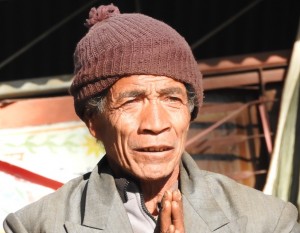 My visit to the project site was concluded with a community meeting in which 88 people participated to welcome TRAS’s visit, review and report about the toilet construction progress and provide individual feedback from the beneficiaries. It was a beautiful sunny morning, in the open air on the ground of the community school. I had the opportunity to listen to the pains and pangs from the villagers, both men and women, during and after the earthquake, the continued struggles and their hopes for the future. They asked me to give my impressions of their village and their work. I told them what I saw, how I felt and how I visualized their upcoming future. With jubilation, the meeting concluded. The SFSS committee members walked up to the road to bid farewell.
My visit to the project site was concluded with a community meeting in which 88 people participated to welcome TRAS’s visit, review and report about the toilet construction progress and provide individual feedback from the beneficiaries. It was a beautiful sunny morning, in the open air on the ground of the community school. I had the opportunity to listen to the pains and pangs from the villagers, both men and women, during and after the earthquake, the continued struggles and their hopes for the future. They asked me to give my impressions of their village and their work. I told them what I saw, how I felt and how I visualized their upcoming future. With jubilation, the meeting concluded. The SFSS committee members walked up to the road to bid farewell.
Sewa – the Thami way of saying namaste!
Munsel-ling School Classroom Furniture Project
Project #319 – 2014
In the bitter cold of a Spiti winter, in the foothills of the Himalaya, the children are sitting in school all day on the floor. It is difficult to focus on learning when it is cold and uncomfortable.
With your help, the children have desks. Just $32 purchased a solidly built desk with built in bench. Learning will improve!
18 years ago there was no school at all for these children, and life was a perpetual round of poverty.
Enter the local Buddhist Society, whose members believed that the children from the poverty stricken villages deserved an education and that, given a chance, they would shine. TRAS has been supporting the school since its humble beginnings
The school complex is now the largest ‘village’ in the Valley and the first graduates are showing astonishing success in several fields. They are returning to serve their community as teachers, nurses, doctor, vet and engineers.
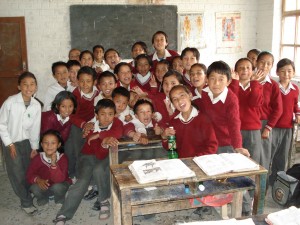
Munsel-ling School is now so successful that more villagers are begging to have their children educated there. As a result, the school has built 8 new classrooms this year. The children are currently sitting on the floors – and in the bitter cold of Spiti that is no fun.
TRAS, with the help of their donors was able to provide 150 double desks with benches, notice boards and simple supplies. None of the frills of a Canadian classroom – just the basics.
